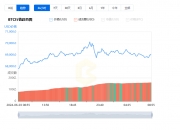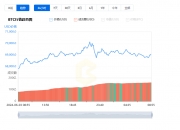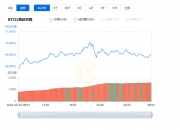火币集团李林:探索前行的区块链行业亟需三类区块链人才
Currency Group Lee Lin: Exploiting the forward sector chain industry urgently needs three types of block chain talent
7月30日,火币大学全球区块链领导者课程(GBLP)第六期趋势模块在杭州正式开课,火币集团创始人、董事长兼CEO李林在杭州为学员们进行了主题为《区块链行业发展及展望》的现场授课。李林细数了区块链行业从比特币的诞生、进入大众视野到产业区块链等各个发展阶段,并直言未来区块链行业呈现四大发展趋势,分别是数字化大迁移、价值互联网、信任基础设施、生产关系变革。
On 30 July, the 6th Trend Module of the Treasure University Global Block Chain Leadership Course (GBLP) was officially opened in Hangzhou, where the founder, chairman and CEO Leelin gave a live lecture on the theme " Development of the Block Chain Industry and Prospects ". Li Lin spelled out the stages of development of the block chain industry from the birth of Bitcoin to the entry of public view to the industrial sector, and pointed out four major trends in the future sector of the block chain, namely, digital migration, value Internet, trust infrastructure, and changes in productive relationships.
区块链行业的探索在波浪中前进
作为新一代信息技术中的关键领域,区块链是由一系列技术实现的全新去中心化经济组织模式,2009年诞生于比特币系统的构建,2017年成为全球经济热点。去年以来,区块链行业涌现出新的趋势,数字法币、产业区块链、DeFi等方向的探索都为区块链行业带来全新的视角和发展空间。
As a key area in the new generation of information technology, the block chain is a completely new model of decentralised economic organization with a range of technologies, which was created in 2009 by the Bitcoin system and became a hotspot in the global economy in 2017. Since last year, new trends have emerged in the block chain industry, and the exploration of digital coins, industrial block chains, DeFi, etc. have brought new perspectives and development space to the block chain industry.
“区块链行业多年来一直在波浪中前进,整个行业都在探索,会经历波峰、波谷。” 李林以区块链技术、区块链商业模式及其应用的发展过程为例,讲述了区块链行业不断修正和发展的探索过程。同时李林直言,市场对区块链技术短期的影响力有些夸大,而可能低估了未来创新的影响力。
“The block chain industry has been moving forward in waves for many years, and the industry as a whole is exploring and going through peaks and valleys.” Li Lin, for example, describes the development of block chain technology, block chain business models, and their applications, describing the process of exploring how the block chain industry is constantly being revised and developed.
实际上,区块链涉及IT、通信、密码学、经济学、组织行为学等诸多知识领域。在李林看来,区块链思维要涵盖区块链技术的多个特质,比如社区化的自组织、实现分配更公平、去中介化以及全球化等。这也意味着区块链行业亟需三类人才,一是产业区块链人才、二是底层区块链的技术人才、三是具备全球化视野的人才。
In Li Lin’s view, block-chain thinking encompasses many of the characteristics of block-chain technology, such as community-based self-organization, more equitable distribution, de-intermediation, and globalization. It also means that the sector needs three types of talent, one in the industrial chain, the other in the bottom sector, and the third in the globalization landscape.
火币大学作为聚焦于区块链应用和数字经济发展的领先教育机构,目前开设了一系列区块链领域技术、市场、运营与管理人才的培训,培养了大量区块链专业人才。火币大学的全球区块链领导者课程(GBLP)是行业公认的顶级区块链线下课程,以“探索商业变革前沿新知,一步迈入区块链界核心圈层”为课程宗旨,在北京、杭州、深圳、硅谷、东京开课,全球顶级数字经济实践者和研究者授课。全球区块链领导者课程(GBLP)第七期将于9月底开课,目前已经正式启动报名,可关注”火大教育“公众号了解课程详情。
As a leading educational institution focused on block-chain applications and digital economic development, the University has now developed a series of block-chain trainings in technical, market, operational, and managerial skills, training a large number of block-chain professionals. The global block-chain leader course (GBLP) at the University is a recognized industry top block-line course whose purpose is to “explor the frontier of business change, step-by-step into the core circle of the block-chain”, which is taught in Beijing, Hangzhou, Shenzhen, Silicon Valley, Tokyo, and by leading digital economy practitioners and researchers at the global level. The seventh phase of the global block-chain leader course (GBLP), which is due to begin at the end of September, has now been officially launched.
“随着更多人了解区块链,更多的行业进入区块链世界,都将加速整个行业区块链化的过程,加速各个产业区块链的融合过程。”李林说。
“As more people know the chain of blocks and more industries enter the world of the chain of blocks, they will accelerate the process of the entire industry block chain and the process of integration of the chain of industrial blocks.” Li Lin said.

未来区块链行业呈现四大发展趋势
过去20年是互联网的革命,它改变了沟通、社交、出行的方式。互联网是信息的革命,而区块链是信任关系的革命,它将可能彻底改变人类社会价值传递的方式,重新定义每个人的生活方式和社会形态。
The past 20 years have been a revolution in the Internet, which has changed the way in which people communicate, socialize, travel. The Internet is a revolution in information, and the chain of blocks is a revolution in relationships of trust, which has the potential to radically change the way in which human social values are transmitted and redefine the way in which everyone lives and lives.
李林基于当前的技术特点和多年的实践思考,提出了区块链未来的四大发展趋势:数字化大迁移,价值互联网,社会治理、社会协作、信任基础设施和生产关系变革。
Based on current technical characteristics and many years of practical thinking, Li Lin identified four major future trends in the block chain: digital migration, value Internet, social governance, social collaboration, trust infrastructure and changes in productive relationships.
具体来看,李林首先提到数字化大迁移,即资产上链,人人拥有数字资产。李林认为,资产上链后,流通效率和自由度会大幅提高。区块链的高效网络具有虹吸效应,未来随着基础设施和法律法规的不断完善,不同资产在不同的阶段会以不同的方式上链。
Li Lin argues that once assets are brought up, the efficiency and freedom of movement will increase significantly. The efficient network of block chains has an inhaling effect, and different assets will be chained in different ways in the future as infrastructure and laws and regulations continue to improve.
其次,价值互联网是一个非常确定的趋势。李林解释称,区块链构建的数字金融网络,像数字法币、DeFi、ETH、Libra、DCEP等都会给传统金融业带来巨大变革,使整个交易流程更加便捷、高效。
Second, value Internet is a very definite trend. Li Lin explains that digital financial networks built by block chains, such as digital coins, DeFi, ETH, Libra, DCEP, etc., bring about significant changes in the traditional financial sector, making the entire transaction process easier and more efficient.
除了应用在金融领域外,区块链也是交换信息、交换数据的分布式账本,能建立数据互信。因此,社会治理、社会协作和信任基础设施同样是区块链的未来趋势之一。 “这是未来很大的产业生态链,在各个行业各个领域,大家都要建立互信。” 李林认为发现场景是关键,这类场景可以分为两类:一类是自上而下,政府开发产品,用区块链技术去改变现有的管理技术;另一类是龙头企业来开发产品,提升社会协作能力。
In addition to being applied in the financial field, block chains are also distributed accounts for the exchange of information and the exchange of data, which can build mutual trust. Thus, social governance, social collaboration, and trust infrastructure are also one of the future trends in block chains.
最后,李林在授课时从数字产权确权、保护,价值创造量化和可信价值分配的三个角度阐释了生产关系变革的发展趋势。未来,区块链技术可以实现数据的确权和保护,把每个人在不同体系、不同平台的碎片化价值进行量化。随着生产力的发展,生产要素和生产形态的多元化,区块链能够创造更合理的分配机制。
Finally, Li Lin’s lectures illustrate the evolution of productive relationships from three angles: digital property rights, protection, value creation, and a credible distribution of values. In the future, block-chain technologies can achieve real rights and protection of data, quantifying the fragmented value of each person in different systems and platforms.

责任编辑:戴明 SF006
注册有任何问题请添加 微信:MVIP619 拉你进入群

打开微信扫一扫
添加客服
进入交流群



















发表评论